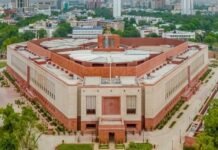New Delhi: Mark Carney, the former central banker poised to become Canada’s next prime minister, has signalled his intent to mend frayed ties with India, a move that could mark a turning point in diplomatic relations that had soured under Justin Trudeau’s tenure.
“What Canada will be looking to do is to diversify our trade relationship with like-minded countries,” Carney said last Tuesday in Calgary before securing leadership of the governing Liberal Party. “And there are opportunities to rebuild the relationship with India. There needs to be a shared sense of values around that commercial relationship. If I’m prime minister, I look forward to the opportunity to build that.”
Carney’s remarks come amid Canada’s ongoing struggle with economic uncertainty, US President Donald Trump’s trade war and annexation threat, and a diplomatic row with India that reached its nadir following Trudeau’s allegations in September 2023. Trudeau had claimed in Parliament that there were “credible allegations” suggesting Indian agents were involved in the assassination of pro-Khalistan separatist leader Hardeep Singh Nijjar in Surrey, British Columbia.
India had swiftly rejected the accusations. “Canada has presented us no evidence,” India’s Ministry of External Affairs (MEA) had reiterated, criticising Trudeau’s government for making “serious allegations without substantiation.” The fallout led both nations to expel diplomats in a tit-for-tat exchange, effectively freezing bilateral engagement.
Carney, 59, faces the immediate challenge of an emboldened Conservative opposition under Pierre Poilievre, who has called for early elections. His domestic agenda will likely take precedence, leaving little room for a swift overhaul of foreign policy. Yet, for India, a pragmatic engagement with Carney’s government may prove worthwhile.
While an immediate reset might not be possible, Carney’s ascendancy provides an opening for recalibrating relations and trade and immigration concerns loom large in any potential rapprochement. The uncertainty surrounding Canadian visas for Indian students and workers has rattled the diaspora, and New Delhi has been vocal about Canada’s alleged failure to curb separatist extremism. New Delhi has long harboured grievances over Canada’s handling of the 1985 Kanishka bombing case and its perceived leniency towards Khalistani separatists.




























